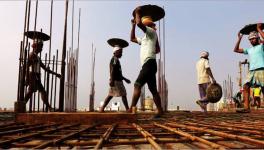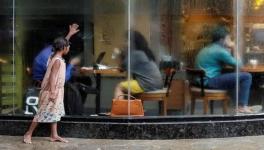Lebanon's Currency Crisis: New Exchange Rate Policy to Cause Massive Hardship
Amid Lebanon's financial and economic crisis, the US dollar is king but it's getting costlier to get hold of it
Lina Boubess, 62, hasn't missed any protests since Lebanon's economic and financial crisis erupted in October 2019.
Although she gained the title of "Mother of the Revolution" because of her constant participation in every anti-government protest in Beirut, Boubess told DW that her life changed dramatically over the last three years, and she became a full-time activist to support the next generation.
"Before the economic crisis, I could afford to travel abroad every month. I used to have a luxurious life. But now, I cannot afford it anymore. I have to think about how to cope here. I don't have a credit card. Banks stole our money," she said.
Although Boubess can still afford to buy food, she doesn't know what will happen later.
"All my life changed. That's why I am on the street," she said.
Boubess is worried about the announcement of the government's plan to slash the official exchange rate from 1,507.5 Lebanese lira per US dollar to 15,000 Lebanese lira — 10 times more than the current official exchange rate.
"This will be terrible for people. Everything is going to cost more. I wonder where the people are. This will be high for me and everybody," she said.
The protests in Lebanon show no sign of abating as the country's economic crisis takes its toll
Why the new exchange rate is essential
On September 28, Finance Minister Youssef Khalil announced that the Lebanese government was planning to gradually increase the official exchange rate starting from November 1. The current rate of 1,507.5 Lebanese lira has been pegged to the US dollar for 25 years.
Khalil's announcement to adjust the official exchange rate is relevant for several reasons.
Since the economic crisis in 2019, Lebanese authorities have officially devalued the local currency for the first time. Secondly, the measure represents the first gradual step to unifying multiple exchange rates.
Furthermore, the unification of the exchange rates is one of the preconditions to unlock the $3 billion (€3.09 billion) financial aid resulting from an agreement between Lebanon and the International Monetary Fund (IMF) concluded in April.
The jungle of Lebanon's exchange rates
Over the past three years, Lebanon's local currency has lost more than 95% of its value; the inflation rate has exceeded 200%, and the United Nations Economic and Social Commission for Western Asia (UNESCWA) estimates that multidimensional poverty rate in Lebanon had nearly doubled from 42% in 2019 to 82% in 2021.
Meanwhile, the Lebanese people have had to cope with multiple exchange rates. Aside from the official exchange rate set at 1,507.5 lira, there's the so-called Lollar rate used to withdraw deposits from banks and currently set at 8,000 Lebanese lira. Then there's the central bank's Sayrafa rate used by commercial banks and foreign exchange dealers set at 29,800 Lebanese lira (at the time of writing). Finally, there is the parallel market rate, currently set at 39,800 Lebanese lira, which reflects the actual value of the US dollar.
Wassim Maktabi, economist and researcher at The Policy Initiative in Beirut, told DW that Khalil's announcement is not binding, and there is currently little to suggest that this will occur.
"He is branding this announcement as a step in the right direction to meet requirements. However, it does not conform with the IMF conditions because the ministry is just adding another exchange rate rather than unifying the other existing rates," he said.
Although the ministry has yet to clarify the practical implications and the time frame, the consequence of the new official exchange rate will have a massive impact on people's daily lives.
Bank holdups by depositors wanting their money back are a sign of the Lebanese gettting more desperate
The move aims to boost state revenues, said Farhat Farhat, a Lebanese economist and co-founder of Lebanon's Depositors Union, which was established in 2019. He told DW that the government will use it to increase the salary of its local party officials.
"I think there will be a depreciation of local currency because employees will use the surplus of their salaries to buy more imported goods. Therefore, the deficit of commercial banks will increase."
As Lebanon relies heavily on imports, the increase in customs taxes rate and value-added tax (VAT) would result in an increase in goods prices, surging inflation, and an increase in the parallel market rate.
How exchange rate policy affects bank depositors
Some 2,000 kilometers (1,242 miles) from Lebanon, Richard Nahas, a Lebanese national who has been living in Dubai since 2010, is worried about the implications of the new exchange rate.
The 44-year-old computer engineer said the consequences of the unification of the exchange rate would be dramatic because half of his savings is in Lebanese lira and therefore subject to further depreciation.
"I'm in a bad situation because my savings protected me if I needed it. But now, I can't get my money from the bank. I have no solution if I face problems here," he told DW.
Meanwhile, Nahas's parents in Lebanon have become increasingly depressed because of the situation and the rising inflation, he said.
"They were considered middle-class people before the economic crisis as they could live with their savings. But now, with inflation and the upcoming new exchange rate, they won't be able to do so. They cannot go to the doctor or buy medication. I have to help them. But I am not in a good situation as before," he said.
Lebanese Prime Minister Najib Mikati has reassured his fellow citizens that the gradual implementation of the new exchange rate would initially exempt banks' balance sheets and housing loan repayments.
But Maktabi noted that the government had decided to exempt the banks from implementing the new exchange rate to avoid increasing banks' losses and forcing them to bear the major costs they have been trying to avoid since 2019.
As a result, the immediate effects of the new exchange rate for customs taxes will hit people's wallets.
Economist Farhat has urged the government to find a fair solution for people with their deposits locked in the banks, such as giving depositors with less than $20,000 in the bank access to their money to cope with inflation and rising prices.
However, some depositors have started taking matters into their own hands to get their money back by raiding banks with weapons or toy guns.
"They are forced to do so because they need money to eat and to go to the hospital. I totally understand them," Nahas said.
Edited by: Rob Mudge
Get the latest reports & analysis with people's perspective on Protests, movements & deep analytical videos, discussions of the current affairs in your Telegram app. Subscribe to NewsClick's Telegram channel & get Real-Time updates on stories, as they get published on our website.

























